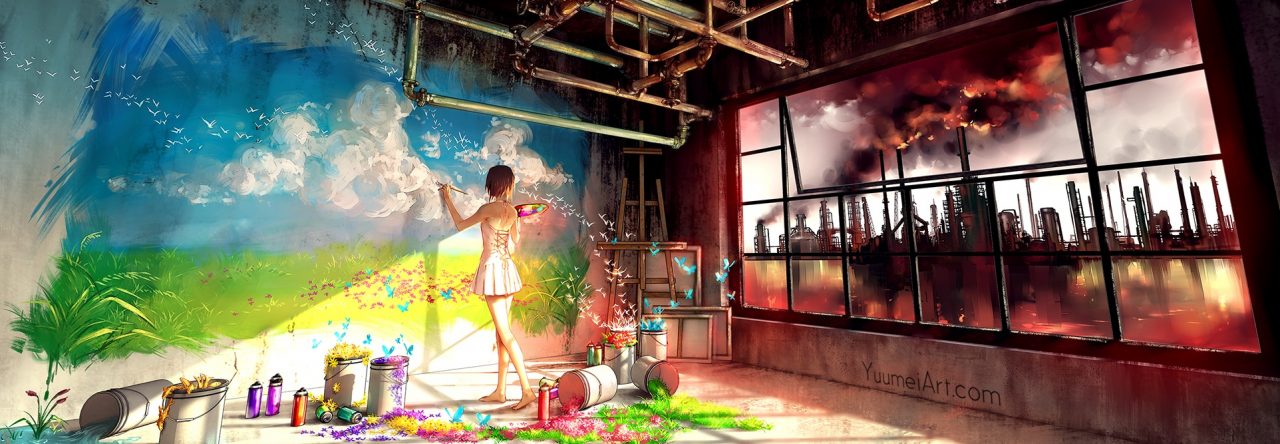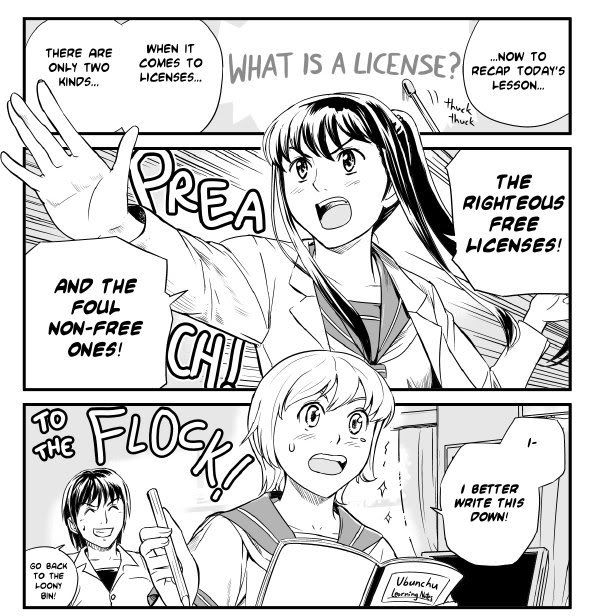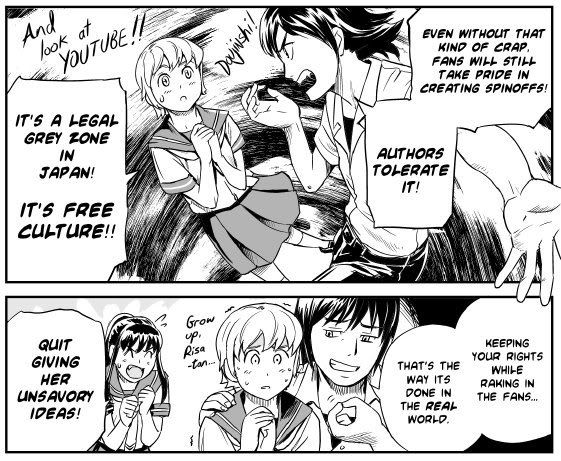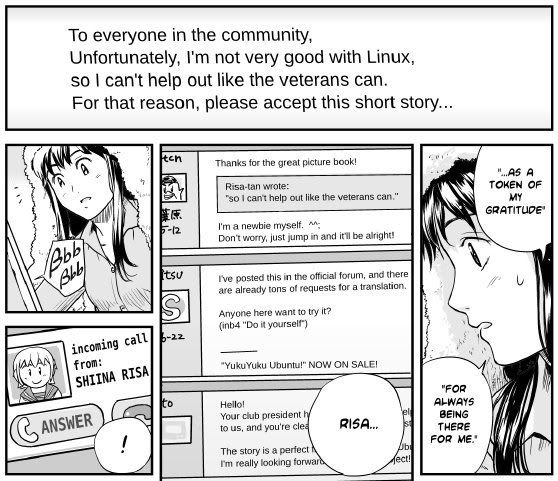(EDIT: For the uninitiated, Ubunchu is a free-licensed manga series thematically centered around Ubuntu Linux, and this is a review of the fourth chapter of said series cum my musings on the viability of free licenses when applied to artwork. I apologize if I have previously confused anyone by leaving out this introduction :( )
(EDIT: I can’t believe I forgot the link to the manga again!! You can find every translated chapter of the free-licensed Ubuntu-oriented manga here)
With every chapter so far thematically alluding to one Ubuntu / free software related idea or another, Ubunchu is starting to feel somewhat like a documentary. Reminds me of one of those “Manga guide to Databases” things. And that’s not a bad thing by the way :P
Anyway, this chapter is about free licenses. As usual we have a simple story involving our three main characters woven around the idea being introduced. The story is nothing noteworthy and can be leisurely consumed as lightweight entertainment, but I think Ubunchu has brought up something rather interesting this chapter. Free licenses are no foreign concept in the world of software, and free software has more than proven itself in the past decade or so. However when applied to broader realms, like artwork as in this chapter, things are a little more muddled.
Does it make sense to apply free licenses to artwork?
The question is much more grey than it is with source code. It is still philosophically appealing, of course, to think of works of art as celebrations of humanity that should be freely shared, admired without restrictions, and collaborated upon where possible. But, as Akane notes, “It’s Risa’s hard work, you know.”. Being products of talent, inspiration and hard work, it’s natural to wish to maintain a kind of ownership over it. Especially with the amount of plagiarism and theft of work going on nowadays. One could argue that this is to a certain degree the case with software as well, but with software the benefits of releasing your code is clearer. Source code is much more malleable than artwork is, and a shared, community developed piece of code can clearly be leaps and bounds better and more powerful than a piece of code maintained by even the most brilliant of programmers. It’s hard to argue the same case with artwork.
I did find the following conversation interesting though:
And not just for the perverse pleasure of watching Risa getting terrorised :) What’s noteworthy here is that Masato is right! Japanese otaku subculture is, unwillingly and unwittingly, the closest thing we can find today to a culture of freedom involving artistic works. And you know what’s interesting? It’s thriving – somewhat at the expense of the actual industrial players, but there is little doubt that the subculture itself is today as resilient, diversified, and far-reaching as can be. It isn’t coincidence or luck too. Why is anime a culture when Holiwood isn’t? When you trace it down to the ground the only reason anime cons are possible today is that you don’t need to ask permission or pay royalties for dressing up as characters of a copyrighted work, for singing copyrighted songs, and for displaying and selling blatant (but excellently done!) spinoff artwork and stories. The only reason I can adorn my wallpaper and this blog with tributary decorations to my favourite animes is because doujin and vector wallpaper artists aren’t being regularly persecuted. In fact the only reason we unenlightened gaijins are even able to regularly talk about the latest shows and manga chapters is because of the hard work of our faithful, legally dubious (but fantastic!) fansub/scanlation groups. Japan’s inability to keep a legal iron fist over the consumers of the industry has ironically empowered the subculture to spread freely across every nook and cranny of the world that the internet is able to reach. It has also allowed the culture to scale beyond the professional works themselves into a wildly diverse pool of literature, fan-works and spin-offs of jaw-dropping quality. And all these, offsprings of the subculture and the freedom that permits their existence, in turn contribute to the color and captivity of the culture itself, taking it further, bringing in more consumers, more contributors.
When you look at it like that, it’s almost just like what happened with free software. Could it be?
It’s still a push to make that claim of course, especially since we know that the heart of the otaku subculture – the producing industry itself, is falling on hard times, being unable to quite adapt to the free nature of the culture. The challenge would probably be to see if a critical group of companies – then again they may not need to be companies, organisations – is able to sustain itself while riding the currents of freedom. To some extent the industry is already adapting – leveraging the doujin/niko-niko culture to identify and poach promising artists whose works they could publish and sell. The story of Supercell in particular impresses and inspires me. It’ll be interesting to see where this goes :)
And oh shit, I went completely off tangent with the review – AGAIN. Well, I guess I don’t really have too much more to say about the chapter (unless you want to hear me RAGE about lack of Slackware-Infatuated, CLI-wielding Geek Tsundere-chan action!).
Nice that Risa decided to go through with releasing her work after all of that. It can get ugly, but it could also prove very rewarding. Especially in communities like Linux’s where people tend to appreciate their allies more ;)
Wonder when the next chapter will be out, and what the next item in the documentary will be. Until next time :)
(EDIT: decided to try having this syndicated at Planet KDE and see if I get blown to bits xP)





dai1313
Ugh. You beat me! I was (more or less) trying to write something on this – and then I take a look at my feedreader and I am like… gah.
And then you have to go above and beyond the call of duty and write some brilliant and insightful post about free licences and how they affect us and stuff. Great. THANKS A LOT.
Anyway now I feel satisfied. You see, I once again made the stupid mistake of opening up the manga and going into it thinking I would learn something or at least be given some food for thought….
Any way, I might write my thoughts down on my own blog… or if I fall back into lazy bum mode I will put them here.
idyllictux
Manuel Castells in the World Social Forum:
“Conventionally, in a capitalist economy, property is the right to exclude others from the use of a good or service. In open source, property is configured fundamentally around the right to distribute, not to exclude. The source code for open source is published and distributed for the use by anyone who wishes. And because the source code is known, users can modify it, and can modify or generate new applications. Free source code is open, public, and non proprietary. This new form of property, that is entirely contradictory with the usual regime of intellectual property rights, is supported by a governance system that holds together a community of producers. It is based on human motivation to work within this logic and is supported by an evolving set of organizational structures to coordinate behavior.”
We are all bricolage in the opensource world and we love it. *Perform unlimited pirate work on yuenhoe’s posts, guides and softwares.*
Flamebait:
1 liner alias to keep it handy in .bashrc. In linux we love and we share.
alias p5=”ps -eo pcpu,user,pid,cmd | sort -r | head -6″
Jason "moofang"
@ dai1313 : Haha, ummm, glad to be of service ^^ I popped over to your place before writing this too to see if you have beaten me to it, but looks like I win this round >=D
I think you should go ahead and write what you think anyway though :)
@ idyllictux : Haha, nice quote. And I didn’t understand your one-liner at all Dx I’m a very simple bash user :P
Mark Kretschmann
Hmm, Jason. The artwork in your article is really fantastic (you seem to be very gifted).
But somehow I’m still missing the core message of the article, despite trying to read it three times (I blame my hyperactivity).
Can you put the message in a nutshell? :)
Regards,
Mark.
Jason "moofang"
@ Mark : Hi. Oh my. I apologize really – now that I’ve reread it, it must sound pretty confusing to the uninitiated. I really should have added an introduction of sorts. Okay, let me explain.
The artwork isn’t mine, it’s from a manga/comic called ‘Ubunchu’, which is essentially a comic series released under creative commons by an artist in Japan – and which, as the name suggests, is thematically centered around Ubuntu – and thus Linux and free software. This article is a review of the latest chapter.
So it turns out that the latest chapter talks about Free Licenses – but applied to artwork, and that kind of got me thinking about how viable free licenses might be when applied to artwork instead of source code. The rest of the review is mostly my musings on that topic. In a nutshell what my post says is the following:
“free licenses are by now obviously viable and good for software, but it’s harder to tell with artwork. Interestingly though, there exists a reasonably close example of a free culture involving artwork – that’s Japanese otaku subculture, and if we analyse said culture we find many parallels to free software culture that appear to contribute to it’s proliferation and resilience. So maybe freedom CAN work in the artistic world too. Maybe.”
I apologize again for the confusion. When I first wrote this post I meant to simply write a review and didn’t think of posting it to Planet KDE. But the more I thought about the idea of freedom in the arts the more I liked it, so I got excited and decided to try pushing the post onto Planet KDE and see if I could garner some opinion. I should have been more careful :(
Thanks for reading and asking though. I’ll go add an introduction to the post so that I’ll hopefully stop confusing people.
WindPower
Thanks, you reminded me of blogging about this too, hehehe.
Good luck with Planet-KDE… I think you should try presenting an article that’s more KDE-related first.
You make a point about Japan’s otaku culture. When I hear otaku culture, I think nicovideo, fanfics, etc… but I don’t think open-source… I guess it makes sense but the difference is that the original authors of a work don’t necessarily want spinoffs, it’s just the fans who do it anyway; whereas for software, the main developers, if they release something with an open-source license, want to see what other people can do with their stuff.
Jason "moofang"
I see your point there. From what I know though this is not always the case anymore. It turns out that doujin culture is so prevalent and de-facto “mainstream” today that some authors actually treat it as an acknowledgment of their work – even an honor – for fans to make spinoffs out of it. And of course, you’d be hard pressed to find any present system where authors would willingly ask people to make spinoffs. In Japan it happens because they can’t fully enforce copyright – and that’s the closest we’ll ever get as long as no one believes in a free system.
Also, resistance to adoption of a model as radical as freedom in a traditionally copyright-strong field is somewhat expected – free software took a good while to gain industrial recognition too. The question here is that – SUPPOSE we could convince people – will it actually work? Ie, will a free model trump the current copyright-based model?
Stefan
Hey, I can’t speak for the entirety of the Planet KDE readership, but I have to say, I was pleased to read your post. The manga looks interesting, and I really appreciated your discussion of free licenses as applied to artwork. Thank you.
Jason "moofang"
@ Stefan : Your comment just made my day, so thank YOU :)
Zhiwei
Randomly poking fun: why not just remove those *other* categories and turn this entirely into an anime blog- It already looks that way. :P
Jason "moofang"
But it isn’t just an anime blog, or at least I (think I) don’t want it to be :) I do have 2 tech-ish dev-ish posts who are supposed to have gone up but are missing due to lack of time and travelling for CNY. They should eventually appear and then this place will look more, um, varied ^^
ask
If you desire to improve your experience simply keep visiting this web site and be
updated with the most recent gossip posted here.